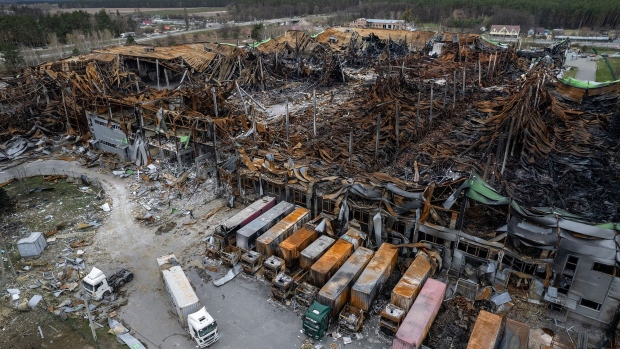Apr 19, 2022
Ukrainian Troops Risk Being Encircled in New Russian Offensive
, Bloomberg News

(Bloomberg) -- Russia has launched what Foreign Minister Sergei Lavrov hailed as a second phase of the war in Ukraine, and early indications are it could go better for Russia than the first.
After a ferocious night of artillery bombardment along a 300 mile (482 km) front line in the east, Russian forces took a pocket of territory including the city of Kreminna on Tuesday, according to the Ukrainian regional governor.
As a result they threaten to encircle an area at the top of the eastern front that, according to one military analyst, holds as much as 40% of Ukrainian troops in the region.
Columns of tanks and other armored vehicles were also seen heading north on the road from the southeastern port of Mariupol, the besieged city where the last group of defenders are now barricaded into the bunkers of a steel plant.
“In the east and south of our country, the occupiers are recently trying to attack in a little more thought-out manner than before,” Ukraine’s President Volodymyr Zelenskiy said in a video address late on Monday night. “However, they should not hope this will help them.”
Already the different terrain, reinforcements and a more traditional combination of air and artillery power appear to have had some impact, with a sharp increase in bombing, missile strikes and artillery fire enabling the initial advance.
With Russia stepping up its bombardment of transport infrastructure across the country, Ukraine’s ability to quickly deliver Western arms 1,350 kms from the Polish border will also be a challenge.
“If the Russians can encircle those troops they will try to bleed them dry of ammo and manpower just like in Mariupol,” said Osint Aggregator, the platform of a military analyst who collects so-called open source data on the conflict, in a Twitter thread. “The Russians have re-opened a southern axis in an attempt to start that encirclement.”
That was a view widely endorsed and celebrated on pro-Russia Twitter and Telegram channels on Tuesday. But whether Russian forces can succeed in the east where they failed in the north around Kyiv remains an open question, hotly debated among officials and military analysts.
Much of the discussion around timeline has focused on May 9, when Russia marks its victory over Nazi Germany in World War II with an annual military parade, and whether President Vladimir Putin is seeking to be able to declare some sort of win at that point in Ukraine.
Russian Troops Risk Repeating Blunders If They Try for May 9 Win
U.K. Prime Minister Boris Johnson told a meeting of cabinet ministers on Tuesday the war was now likely to drag on for months and Ukraine was in a “perilous” position, according to his spokesman, Max Blain.
Despite advantages in troop numbers and fire power, a security official told the cabinet that poor morale and an ongoing piecemeal approach suggested the new offensive would not be decisive, with Russian commanders repeating earlier mistakes, Blain said.
Some military analysts also pointed to the still relatively small number of Russian troops, estimated to be around 80,000, for the scale of the task.
“If this intelligence is right, that Russia has 76 BTGs in Ukraine, it has to be said it’s not a lot to launch a major offensive,” Phillips O’Brien, professor of strategic studies at Scotland’s St. Andrews University wrote in another Twitter thread. He was referring to a U.S. assessment that Russia had added another 11 Battalion Tactical Groups, each with about 800 troops when fully manned, to the eastern front.
The rush to begin the offensive means another 22 BTGs that, according to a Pentagon briefing on Monday, are still being reconstituted. Meanwhile, Russian tanks may again struggle to spread off-road for a wider assault, given the muddy conditions likely to continue into May.
Yet the intensity of demands from Ukrainian commanders for nations to quickly deliver the kinds of heavy weaponry needed to resist suggests they are aware that on the more open battlefields of the east, Russia is in a better position to make use of its advantages in air power and long range artillery.
U.S. President Joe Biden held a phone call with other Ukraine allies on Tuesday, to boost provision of military and other aid.
At the same time, Russian forces also renewed heavy bombardment of Mykolayiv, the gateway to the key port of Odesa, and took a number of steps indicating their intent to keep gains already made in the south, beyond the Donbas region that Putin has declared independent and says he is liberating.
In Berdyansk, a sister port to Mariupol in the Zaporizhzhia region, Ukrainian emblems were removed from government buildings for replacement. In the Rozovsky district of Zaporizhzhia, a hall full of mainly elderly people voted by show of hands to join the neighboring, separatist Donetsk People’s Republic.
None of those moves suggest any victory Putin might declare on May 9 is likely to be one that Ukraine can accept and so end the war.
©2022 Bloomberg L.P.


